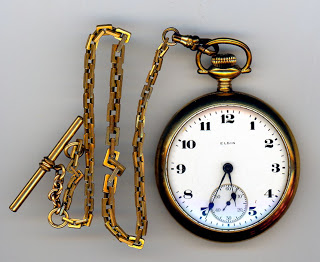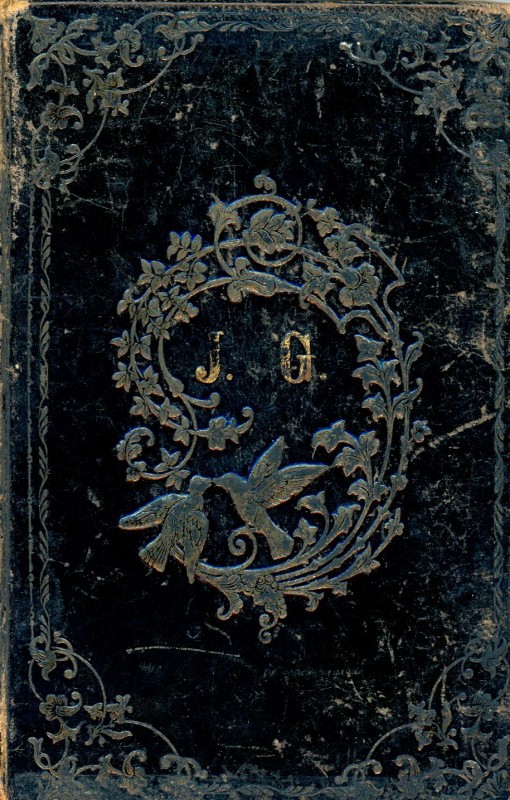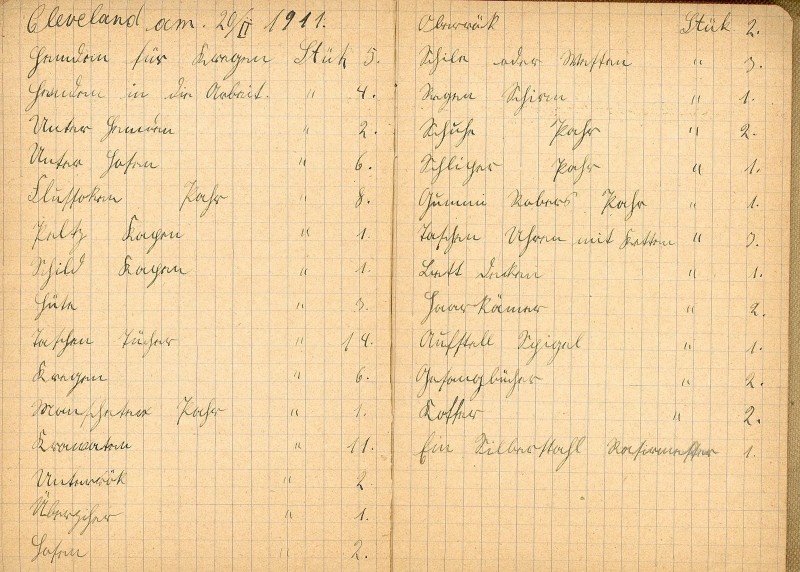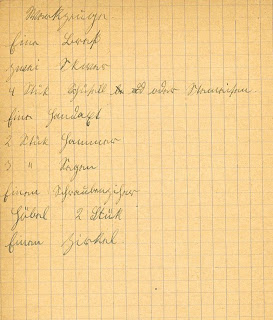The pocket watch lay in Box 14 for the past seventeen years—and untold decades prior—in my grandparents’ cedar chest. I had assumed it was my grandfather’s watch, but didn’t know when he had acquired it. Its wide, crisply-numbered face and long gold chain made me wish I had a small pocket in which I could carry it, so I could take it out on occasion to look at the time, just like in the old movies. But that was impractical, if not impossible. I’ve come across this watch numerous times as I’ve revisited Box 14 to confirm a date, find a letter, marvel at all my grandmother saved. But recently I’ve discovered a previously unknown document that makes the pocket watch even more precious. More on that later.
Also housed in Box 14 is a collection of German song books. Embossed on the front of one are my grandfather’s initials (“J.G.” for Josef Gärtz). It is actually a church hymn book, for the title page reads (in translation): The Song Book of the Evangelical Community Church in the Siebenbürgen section of Hungary. But what has brought these items to discussion on this post is a connect-the-dots sort of discovery that imbues these objects with extra meaning.
I have written in a previous post (“Crossing in Winter”) that Josef had made his last diary entry about his trip to America, when he described the brutal winter Atlantic crossing he embarked upon on New Year’s Eve, 1910. But he actually did write in the diary again—two months later. After arriving in America on January 11, 1911, Josef traveled to Cleveland, Ohio, where he met up with a family from his home town of Neppendorf. He made one more entry, dated: Cleveland, February 20, 1911, a century ago. It was a packing list.
Given he had written it more than a month after his arrival in America, I can surmise one of two things from this list. Either he had carried these items along on the ship and decided a month and a half later to simply write down everything he had brought or, perhaps, he had shipped them separately and recorded them as he unpacked. I’m inclined to believe the latter because of the quantity of items and the weight. He was a carpenter, so it was essential to bring along tools of his trade if he were to earn a living, and this list proves he did just that.
Upon reading it, I had an “Aha” moment. Perhaps you, like I, can look at this list and try to imagine what you would choose to start life anew in a 5,000-mile distant land, probably never to return home.
Most importantly, that shiny gold pocket watch had new cachet because it is an artifact from Josef’s origins, a constant reminder to him of “home.” And although I knew the song/hymn book originated in Siebenbürgen, its pedigree and connection to our family’s past is made all the more real by seeing its inclusion on a list, written in his own hand.
Here’s the translation of Josef’s packing list, not necessarily in the same order, compressed for space.
Cleveland 2/20/1911
2 overcoats
5 shirts; 1 umbrella
4 work shirts; 2 pairs shoes
2 undershirts; 1 pair slippers
6 underpants; 1 pair rubber boots
8 pair socks; 1 pocket watch with chain
1 fur collar; 1 bed cover
1 cap; 1 hair comb
3 hats; 1 mirror
14 handkerchiefs; 2 song books
2 suitcases
11 ties; 1 silver razor
2 Undercoats? (perhaps an extra layer—like a sweater)
2 pair pants
Separately, he listed “Werkzeuge”—Tools:
“press” (perhaps a vice)
2 squares
4 chisels or crow bars
1 handax
2 hammers
3 saws
1 screwdriver
1 plane
1 compass
Now that Josef had his tools and was settled in a bit, it was time to turn his attention to persuading the love of his life, Lisi Ebner, to join him. Their 100-year-old letters, coming up, show us how it was done.




Linda, your growing work on this family story is astonishing. Your writing is so captivating and compelling.
Great job!
Helen
Oh Linda, what a treasure to have all these pieces and what a joy to see how you’re assembling the pieces. I have no idea what items my grandparents brought from Europe beyond my grandfather’s picture of his mother. It’s such a treat to follow another migration story that is so beautifully documented.
I particularly enjoyed this post. It’s great you were able to connect the dots.
Linda you have been awarded One Lovely Blog award.
Please visit my blog here: http://familycherished.blogspot.com/2011/03/one-lovely-blog-award.html to receive.
Congrats and really enjoy your blog!
Linda, To answer your question about which software I use, I still use my PAF 5.0 and it still works fine. But because they will not be releasing further updates, I decided to get RootsMagic. I think RootsMagic is a good choice and you can import what you have on PAF fairly easily. Good luck and hop this helps.
I think too a watch with chain is so cool. it is nice to see that list. I was told my mail order bride just came with a tool box, I was trying to figure out what that would look like, so I googled. Then I was trying to figure out if she brought a dress. It’s fun to have it all before you. and it’s fun to read your info of what he actually had..
I was not aware of those places in germany.There is so much to know.
Dear Rootdigger,That’s so cool that you actually googled to get more info. It’s easy to get caught up in this stuff. The dress…well… this was Josef’s packing list, so unless he was charged with carrying something of Lisi’s over, that was unlikely to be packed She was still unsure of his plans–and hers. Just to clarify, my grandparents weren’t coming from Germany — they were ethnic Germas whose ancestors themselves had been immigrants: from Alsace to Austro-Hungary. They came about 1771, and I’m in the process of getting more information about this more ancient relatives. Europe was in flux, with… Read more »
Linda, Recently I discovered a collection of 100 letters of my own written by grandparents and great aunts. Nothing to match the treasure trove you have unearthed in your own dig, but you have inspired me to pore over them to see what I can learn about my own family. And I have also inherited a couple of watches like the one in this post, as well as many other artifacts of the lives of my predecessors, such as my great uncle’s engineering instruments and great grandmother’s sewing machine. You’ve also inspired me to examine these more closely as well.… Read more »
Linda, an undercoat may be a suit coat, back in the era most men wore suit coats whether they were bankers or carpenters.
With all this family history coming together could a documentary be forthcoming.
Bob
The photo of the watch is superb! You must have considerable photography skills
Thanks for all the interest. I’m especially pleased when someone is inspired to investigate their family treasures after reading some of mine. Thanks Ziobob for the tip on the undercoat. I always thought of that as a painting term! Valerie-I’ve heard other good things about Rootsmagic. Clue Wagon’s Kerry uses it. I need to find the time to investigate these programs–gotta get one going and updated. Great to hear from everyone.